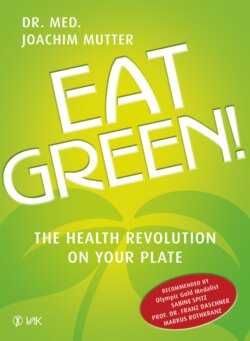Читать книгу Eat Green! - Joachim Dr. med. Mutter - Страница 14
На сайте Литреса книга снята с продажи.
A healthy diet and a slim body – an utopia?
ОглавлениеJournals, “how-to-do manuals”, guidebooks and websites are filled with them: Countless new and old diets, “foolproof” recipes, calorie tables, classifications of allowed or harmful meals, nutritional recommendations for different diseases, daily calory restrictions, a diet respective to the moon or biorhythm or according to ancient health technics (such as Ayurveda, Traditional Chinese Medicine, TCM) – this “over-feeding” of information for a healthy diet can easily confuse all that are interested in living a healthy life.
Among health guides, books about getting slim are right at the top of the bestseller lists. This has two reasons: First, there is a high demand as there are a lot of overweight or obese people. Second, obesity is one of the few widespread diseases that is seen and diagnosable easily. This is not the case with other widespread “chronic diseases” that are at least as frequent or dangerous, such as arteriosclerosis, high blood pressure, chronic hyperglycemia, loss of neurons, Alzheimer’s or cancer in the first stages. These diseases are often diagnosed too late so that the disease, until visibly onset, has between 10 to 40 years to develop undetected.
A lot of the good nutritional advice is often contradictory or not very practical. One popular recommendation, for example, tells you not to eat any carbohydrates but instead a lot of animal protein and fat – others want to reduce the fat in your diet and others in turn recommend protein abstinence or only to eat fruits. Some “experts” claim that humans need meat and milk in order to live – others state the contrary and insist that grain is the best nutritional basis. Some even demonize the consumption of meat but as an “alternative to meat” recommend soy products or lupine protein. There are people who say you should only eat half of everything that is on your plate, others tell you to eat only cooked foods. Many recommend a diet according to the blood- or metabolic type – depending on the results of a blood test, some prefer a diet that is low in gluten, milk protein, histamine, nickel or other allergens.
Last but not least there are also the official authorities responsible for nutrition or organizations of industrial nations that publish recommendations to ensure a “balanced and substantial diet” for their citizens. But most people don’t even know what the recommendations, for example, of the German Nutrition Society actually look like. This takes place also for other countries. An army of qualified “nutrition experts” and dietitians try to make their newest dietary knowledge accessible to the public through governmental institutions, media, hospitals or schools. The nutritional landscape is at every opportunity flooded with campaigns such as “5-a-day fruit & veggies” or a vast array of recipes and cookbooks. On top of that: the medical and pharmaceutical industries and health insurances have been investing a lot of time and money in research, prevention programs and therapies for decades.
They all have the best intention and claim that with their proclaimed diet, people would get healthy or at least would not fall ill. Even doctors are often not sufficiently informed about the importance of nutrition that it has for human health; a medical education does not include dietetics. While many doctors assume that the diet is a factor in the emergence of human diseases, they do not believe that a healthy diet is actually able to heal diseases. Just an example: cancer patients are often told: “you can eat whatever you like!” It’s clear that the majority of the people are confused and resign, become indifferent and continue to eat what is offered by major food companies.
